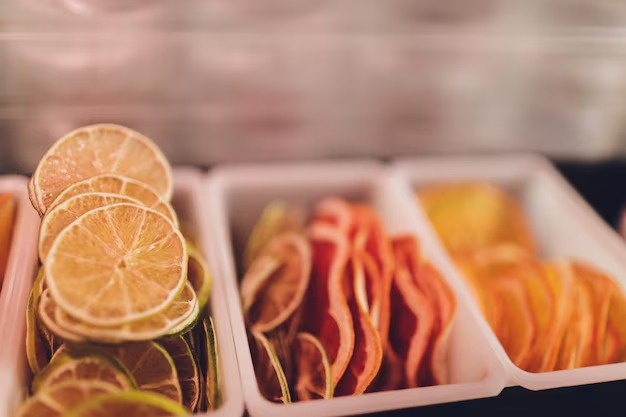How to Make Your Oranges Last Longer: Is the Refrigerator the Best Place?
Oranges are a vibrant symbol of sunny days and refreshing flavor, packed with vitamin C and other nutrients. However, like any fresh produce, they come with a ticking shelf-life clock once you bring them home. How can you ensure these citrus treasures remain fresh and juicy as long as possible? The common assumption is to place all perishables in the fridge, but does this truly help oranges last longer? Let’s delve deep into the science of food storage to offer insights on this juicy subject.
The Shelf Life of Oranges: What to Expect
Oranges are resilient, but their shelf life is influenced by several factors, including temperature, humidity, and the type of orange. Typically, at room temperature, oranges can last about a week, whereas in the refrigerator, this can extend to about three to four weeks.
Factors Affecting Freshness
Type of Orange: Navel and Valencia oranges are among the most common varieties. Valencias might last slightly longer due to their thicker skin, which provides a better barrier against moisture loss and spoilage.
Storage Conditions: The way oranges are stored can significantly impact their longevity. Exposure to air, light, and humidity can quicken the process of decay.
Ripeness at Purchase: Oranges purchased at peak ripeness may last shorter than those bought a bit green. It's essential to assess the firmness and aroma when buying to predict shelf life.
The Refrigerator Debate: Pros and Cons
Advantages of Refrigerating Oranges
Refrigeration generally slows down the decay process, as cooler temperatures can inhibit the growth of mold and bacteria. Here’s why refrigeration can be beneficial for your oranges:
- Extended Shelf Life: Keeping oranges in the fridge can extend their freshness, sometimes doubling their life span compared to room temperature storage.
- Flavor Retention: While some fruits can suffer flavor changes in the fridge, oranges maintain their taste well.
- Reduced Spoilage Risk: Cold temperatures help in slowing down spoilage, especially in a fridge with consistent cooling.
Possible Downsides of Fridge Storage
While there are compelling reasons to refrigerate oranges, here are a few considerations against it:
- Chilling Injury: If stored for too long at too low a temperature, oranges can suffer from chilling injury, leading to less juicy fruits and altered textures.
- Dehydration: Oranges can lose moisture over time in a dry fridge, leading to wrinkling and tough skin.
- Space Issues: If your fridge is often crowded, precious space might be a concern, especially when oranges do well at room temperature for a short while.
Best Practices for Fridge Storage
If you decide the refrigerator is the way to go, consider these tips to maximize freshness:
- Keep Them Dry: Moisture accelerates spoilage, so ensure oranges are dry before storing them away.
- Original Packaging: Store in the breathable mesh bags or loose in the fruit drawer to provide adequate air circulation.
- Humidity Control: Use the crisper drawer, known for controlled humidity, to maintain the right moisture level.
Room Temperature: When Is It Suitable?
Storing oranges at room temperature can be beneficial for shorter-term storage. It provides easy access and is ideal if you plan to consume them within a week or less.
Tips for Room Temperature Storage
Air Circulation: Keep oranges in a bowl, avoiding plastic bags that trap moisture.
Avoid Direct Sunlight: Exposure to sunlight can cause oranges to over-ripen rapidly.
Monitor Consistently: Check for spoilage signs such as soft spots or discoloration to prevent one bad orange from affecting others.
Comparing Storage Options
To provide a clear picture, let's compare storage methods using a simple table:
| Storage Method | Pros | Cons |
|---|---|---|
| Refrigerator | Extended shelf life, flavor retention, reduced spoilage risk | Dehydration risk, chilling injury, space concerns |
| Room Temperature | Easy access, no chilling risk, uses no fridge space | Shorter shelf life, spoilage risk if not monitored |
Signs Your Oranges Are Past Their Prime
Regardless of storage method, it's vital to recognize when oranges are no longer at their best. Look out for:
- Mold Growth: Often appears as white or greenish patches.
- Soft Spots: Indicate internal decay.
- Off Smell: A fermented or sour aroma suggests spoilage.
- Dry, Shriveled Skin: Shows loss of moisture and diminished taste quality.
Enhancing Longevity: Beyond Storage
While storage plays a pivotal role in freshness, consider these additional tips to ensure your oranges last longer:
- Gentle Handling: Avoid bruises by handling oranges carefully during transport and storage.
- Separation from Other Fruits: Store away from ethylene-producing fruits like bananas and apples that can fast-track ripening.
- Frequent Inspection: Regularly check and remove any spongy or overripe oranges to prevent them from affecting others.
Creative Uses for Overripe Oranges
If some of your oranges do reach over-ripeness, don't toss them out immediately. Here are a few innovative ways to use them:
- Fresh Squeezed Juice: Overripe oranges often become sweeter and make excellent juice.
- Culinary Zest: Use the zest in baking or cooking to add citrusy notes.
- Household Cleaner: Combine orange peels with vinegar for a natural cleaner.
Key Takeaways 🍊
- Refrigeration generally extends the life of oranges but monitor for chilling injury.
- Room temperature storage is suitable for short-term and immediate consumption.
- Regular checks and adequate air circulation are your best friends in storage.
- When oranges become overripe, use them creatively rather than discarding them.
In conclusion, whether to refrigerate your oranges depends on your consumption patterns and storage space. By understanding the pros and cons of each method, you'll be well-equipped to keep your oranges fresher for longer, ensuring they remain an uplifting part of your daily diet. So whether you enjoy them fresh or opt for a cool, stored orange, you're now ready to savor the citrusy goodness with confidence.

